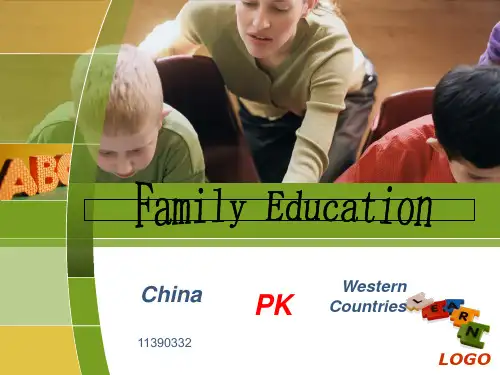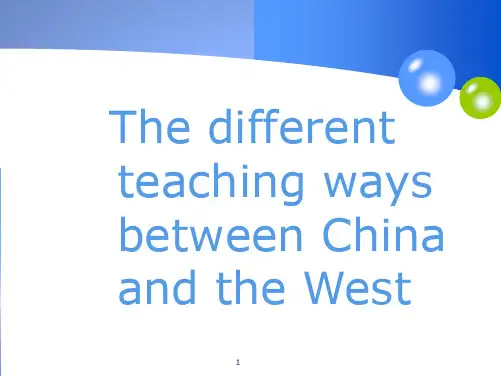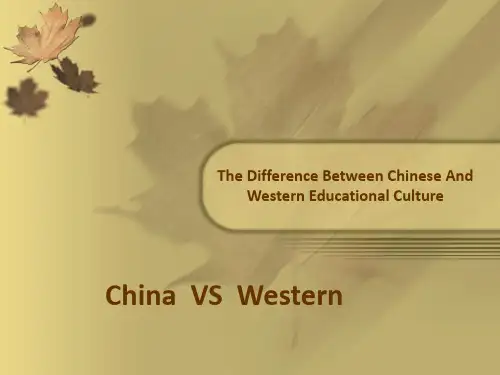中西方家庭教育差异英文
- 格式:ppt
- 大小:1.37 MB
- 文档页数:19
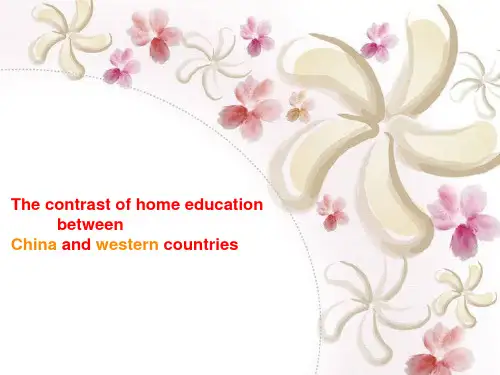
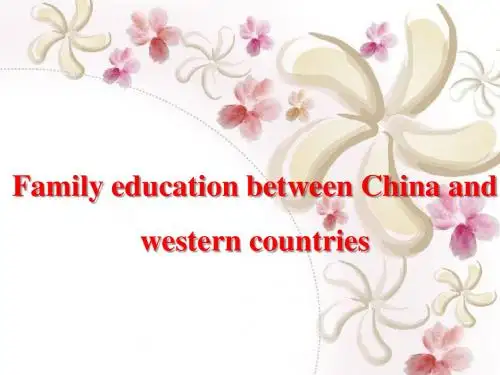
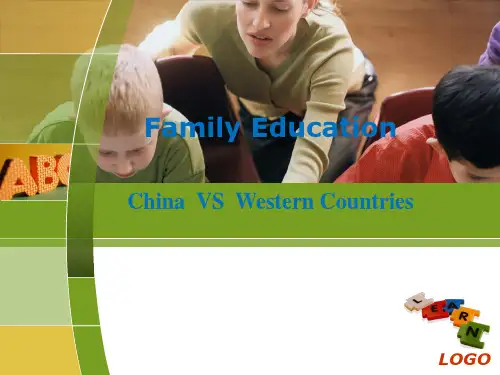
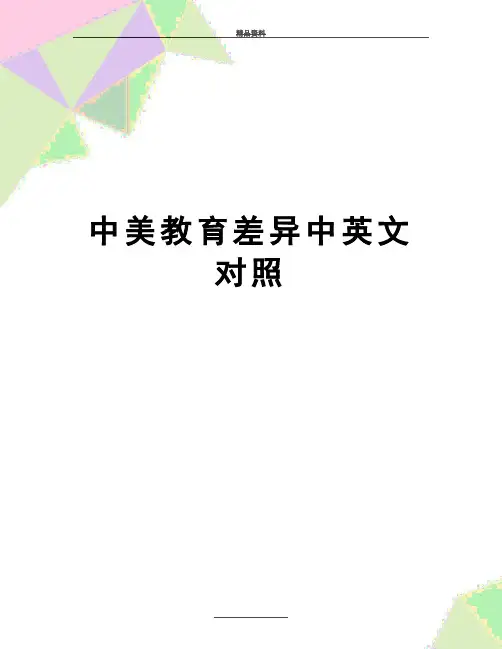
精品资料中美教育差异中英文对照........................................China and Weste rn Countries’ social backgroundRegime---socialist system (China)capitalist system (Western Countries)Historic Culture ---China traditional culture (Confucianism)Western traditionalculture (Revival of Literature and Art, Advanced ideas) Family institution's position---in china's traditional family, parents' authoritativeconsciousness plays a leading roleWestern civilization mainly emphasizes struggle, equality, democracy and human rights.中国和西方国家的社会背景:政权——-socialist系统(中国)资本主义制度(西方国家)历史文化————中国传统文化(儒家)西方传统文化(文学和艺术的复兴,先进理念)家庭机构的立场——中国传统的家庭,父母的权威意识起着主导作用西方文明主要强调斗争,平等、民主和人权。
Social Environmental InfluenceWhat Chinese lack most is the responsibility education. In the United States, it is common to see an adult who is doing something wrong or has some bad behaviors educates a child while the child is not the adult’s own kid. The Americans treat every child as their own child, and it is their responsibility to educate the child. In England, the power of a middle-aged woman is inevitable. They are always in the supervision of the behavior of young consciously, just as the police general. They think it is their duty to observe the children in their country. These two nations have already put the responsibility of educating the next generation to every citizen. Every citizen also shows his responsibility for he future of the country in caring about the children.While in China, who will treat educating the next generation as his own responsibility? If one sees an unknown child who is doing something wrong, will he go and educate him? It is very common in China that adults tend to show indifferent with unknownchildren. What if we change our mind and learn to care others?社会环境影响中国最缺乏的是责任教育。
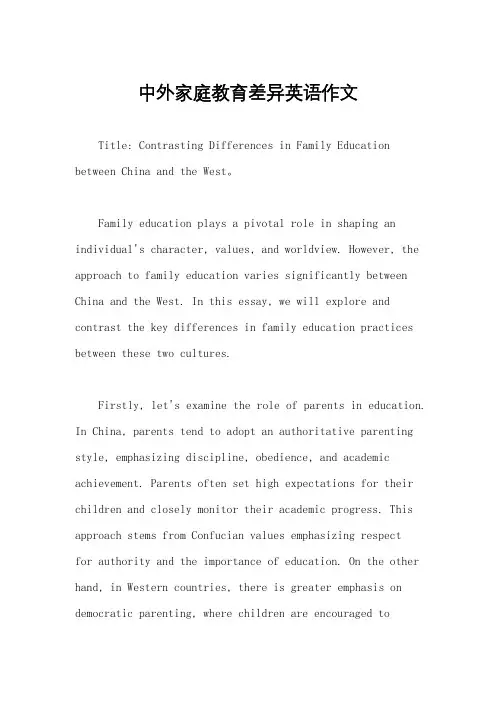
中外家庭教育差异英语作文Title: Contrasting Differences in Family Education between China and the West。
Family education plays a pivotal role in shaping an individual's character, values, and worldview. However, the approach to family education varies significantly between China and the West. In this essay, we will explore and contrast the key differences in family education practices between these two cultures.Firstly, let's examine the role of parents in education. In China, parents tend to adopt an authoritative parenting style, emphasizing discipline, obedience, and academic achievement. Parents often set high expectations for their children and closely monitor their academic progress. This approach stems from Confucian values emphasizing respectfor authority and the importance of education. On the other hand, in Western countries, there is greater emphasis on democratic parenting, where children are encouraged toexpress their opinions and make decisions independently. Parents in the West often prioritize fostering creativity, critical thinking, and emotional intelligence in their children, valuing individuality and personal growth over conformity to societal norms.Secondly, the method of discipline differssignificantly between Chinese and Western families. In China, discipline is often enforced through strict rulesand punishment for disobedience. Parents believe that instilling discipline from a young age is essential for academic success and moral development. Failure to meet parental expectations may result in criticism or even harsh punishment. In contrast, Western parents are more inclined towards positive reinforcement and negotiation. Disciplineis seen as a means to teach responsibility and self-regulation rather than instill fear or obedience. Time-outs, discussions, and logical consequences are commonly used disciplinary techniques, with an emphasis on teaching empathy and understanding the consequences of one's actions.Moreover, the approach to academic pressure variesbetween Chinese and Western families. In China, academic success is highly valued, and parents often exert considerable pressure on their children to excel in school. Children may spend long hours studying or attending extracurricular classes to meet parental expectations. The Gaokao (national college entrance examination) looms large as a pivotal moment determining a student's future prospects. In contrast, while academic achievement is still important in the West, there is generally less pressure and a greater emphasis on holistic development. Western parents encourage their children to pursue their passions and interests, recognizing that success can be achieved through various pathways beyond academics alone.Furthermore, communication patterns within the family differ between Chinese and Western cultures. In China, communication tends to be more hierarchical, with parents holding authority and making decisions on behalf of their children. Open discussions about sensitive topics such as emotions or personal relationships may be less common. In contrast, Western families often prioritize open communication and encourage children to express theirthoughts and feelings freely. Parents strive to buildstrong emotional bonds with their children through active listening and empathy, fostering a supportive environment where children feel comfortable sharing their concerns and seeking advice.In conclusion, while family education serves as a cornerstone of socialization and personal development in both Chinese and Western cultures, the approaches andvalues underlying it differ significantly. Chinese families emphasize discipline, obedience, and academic achievement, rooted in Confucian traditions and a hierarchical worldview. In contrast, Western families prioritize individuality, creativity, and emotional intelligence, valuing autonomyand open communication. Understanding these cultural differences is essential for promoting cross-cultural understanding and collaboration in an increasingly interconnected world.。
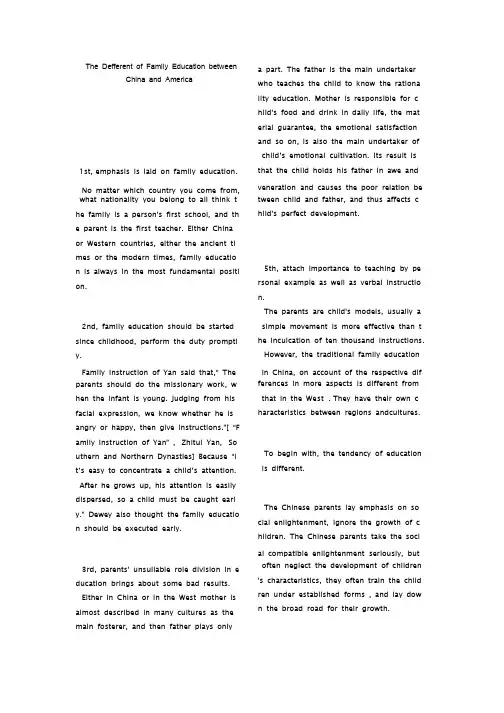
The Defferent of Family Education between China and America 1st, emphasis emphasis is is is laid laid laid on on on family family family education. education. No No matter matter matter which which which country country country you you you come come come from,from, what what nationality nationality nationality you you you belong belong belong to to to all all all think think think t t he he family family family is is is a a a person's person's person's first first first school, school, school, and and and th th e e parent parent parent is is is the the the first first first teacher. teacher. teacher. Either Either Either China China or or Western Western Western countries, countries, countries, either either either the the the ancient ancient ancient ti ti mes mes or or or the the the modern modern modern times, times, times, family family family educatio educatio n n is is is always always always in in in the the the most most most fundamental fundamental fundamental positi positi on. 2nd, 2nd, family family family education education education should should should be be be started started since since childhood, childhood, childhood, perform perform perform the the the duty duty duty promptl promptl y. Family Family instruct instruct instruction ion ion of of of Yan Yan Yan said said said that,“ that,“ that,“ The The parents parents should should should do do do the the the missionary missionary missionary work, work, work, w w hen hen the the the infant infant infant is is is young. young. young. Judging Judging Judging from from from his his facial facial expression, expression, expression, we we we know know know whether whether whether he he he is is angry angry or or or happy, happy, happy, then then then give give give instructions.”[ instructions.”[ instructions.”[ “F “F amily amily Instruction Instruction Instruction of of of Yan” Yan” Yan” ,, Zhitui Zhitui Yan, Yan, So uthern uthern and and and Norther Norther Northern n n Dynasties] Dynasties] Dynasties] Because Because Because “i “i t’s t’s easy easy easy to to to concentrate concentrate concentrate a a a child’s child’s child’s attention.attention. After After he he he grows grows grows up, up, up, his his his attention attention attention is is is easily easily dispersed, dispersed, so so so a a a child child child must must must be be be caught caught caught earl earl y.” y.” Dewey Dewey Dewey also also also thought thought thought the the the family family family educatio educatio n n should should should be be be executed executed executed early. early. 3rd, 3rd, parents' parents' parents' unsuilable unsuilable unsuilable role role role division division division in in in e e ducation ducation brings brings brings about about about some some some bad bad bad results. results. Either Either in in in China China China or or or in in in the the the West West West mother mother mother is is almost almost described described described in in in many many many cultures cultures cultures as as as the the main main fosterer, fosterer, fosterer, and and and then then then father father father plays plays plays only only a a part. part. part. The The The father father father is is is the the the main main main undertaker undertaker who who teaches teaches teaches the the the child child child to to to know know know the the the rationa rationa lity lity education. education. education. Mother Mother Mother is is is responsible responsible responsible for for for c c hild's hild's food food food and and and drink drink drink in in in daily daily daily life, life, life, the the the mat mat erial erial guarantee, guarantee, guarantee, the the the emotional emotional emotional satisfaction satisfaction and and so so so on, on, on, is is is also also also the the the main main main undertaker undertaker undertaker of of child’s child’s emotional emotional emotional cultivation. cultivation. cultivation. Its Its Its result result result is is that that the the the child child child holds holds holds his his his father father father in in in awe awe awe and and veneration veneration and and and causes causes causes the the the poor poor poor relation relation relation be be tween tween child child child and and and father, father, father, and and and thus thus thus affects affects affects c c hild's hild's perfect perfect perfect development. development. 5th, 5th, attach attach attach importance importance importance to to to teaching teaching teaching by by by pe pe rsonal rsonal example example example as as as well well well as as as verbal verbal verbal instructio instructio n. The The parents parents parents are are are child's child's child's models, models, models, usually usually usually a a simple simple movement movement movement is is is more more more effective effective effective than than than t t he he inculcation inculcation inculcation of of of ten ten ten thousand thousand thousand instructions. instructions. However, However, the the the traditional traditional traditional family family family education education in in China, China, China, on on on account account account of of of the the the respective respective respective dif dif ferences ferences in in in more more more aspects aspects aspects is is is different different different from from that that in in in the the the West . West . They They have have have their their their own own own c c haracteristics haracteristics between between between regions regions regions andcultures. andcultures. To To begin begin begin with, with, with, the the the tendency tendency tendency of of of education education is is different. different. The The Chinese Chinese Chinese parents parents parents lay lay lay emphasis emphasis emphasis on on on so so cial cial enlightenment, enlightenment, enlightenment, ignore ignore ignore the the the growth growth growth of of of c c hildren. hildren. The The The Chinese Chinese Chinese parents parents parents take take take the the the soci soci al al compatible compatible compatible enlightenment enlightenment enlightenment seriously, seriously, seriously, but but often often neglect neglect neglect the the the development development development of of of children children 's 's characteristics, characteristics, characteristics, they they they often often often train train train the the the child child ren ren under under under established established established forms forms forms , , , and and and lay lay lay dow dow n n the the the broad broad broad road road road for for for their their their growth. growth. 中国和美国之间的家庭教育Defferent 第一,重点是放在家庭教育。
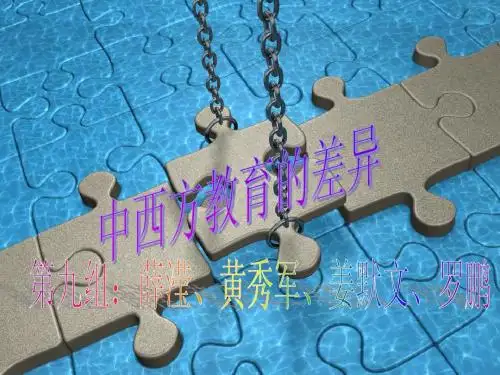
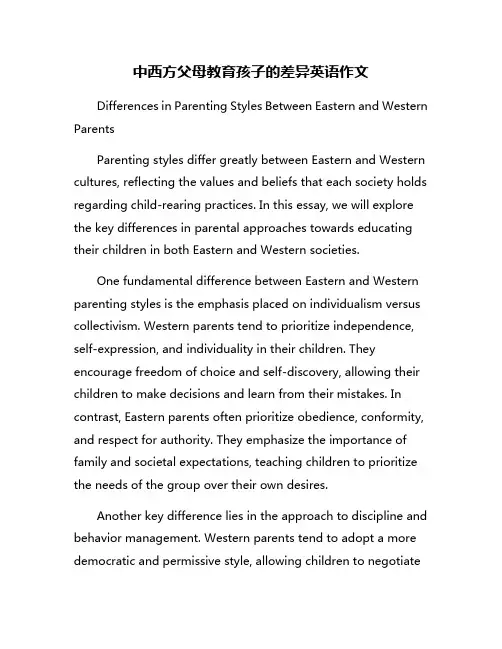
中西方父母教育孩子的差异英语作文Differences in Parenting Styles Between Eastern and Western ParentsParenting styles differ greatly between Eastern and Western cultures, reflecting the values and beliefs that each society holds regarding child-rearing practices. In this essay, we will explore the key differences in parental approaches towards educating their children in both Eastern and Western societies.One fundamental difference between Eastern and Western parenting styles is the emphasis placed on individualism versus collectivism. Western parents tend to prioritize independence, self-expression, and individuality in their children. They encourage freedom of choice and self-discovery, allowing their children to make decisions and learn from their mistakes. In contrast, Eastern parents often prioritize obedience, conformity, and respect for authority. They emphasize the importance of family and societal expectations, teaching children to prioritize the needs of the group over their own desires.Another key difference lies in the approach to discipline and behavior management. Western parents tend to adopt a more democratic and permissive style, allowing children to negotiateand discuss rules and consequences. They believe in reasoning with their children, providing explanations for why certain behaviors are acceptable or not. On the other hand, Eastern parents tend to adopt a more authoritarian and directive style, setting strict rules and expectations without much room for negotiation. They believe in the importance of discipline and structure, instilling respect for authority and tradition.Furthermore, the concept of success and achievement also differs between Eastern and Western parents. Western parents often value creativity, critical thinking, and self-expression as indicators of success. They encourage their children to pursue their passions and interests, even if it means taking risks or deviating from traditional paths. In contrast, Eastern parents often prioritize academic achievement, professional success, and financial stability as measures of success. They instill a strong work ethic in their children, pushing them to excel in school and secure prestigious careers.In terms of emotional expression and communication, Western parents tend to encourage open dialogue, empathy, and self-expression in their children. They value emotional intelligence and believe in the importance of expressing feelings and thoughts openly. In contrast, Eastern parents often prioritizeself-control, emotional restraint, and respect for hierarchy in their children. They believe in the importance of maintaining harmony and avoiding conflict, even if it means suppressing emotions or opinions.Despite these differences, it is important to recognize that parenting styles are influenced by a variety of factors, including cultural norms, personal beliefs, and individual preferences. Both Eastern and Western parents share the common goal of raising happy, healthy, and successful children, albeit through different means. By understanding and respecting the nuances of each parenting style, we can cultivate a greater appreciation for the diversity and richness of global parenting practices.。
